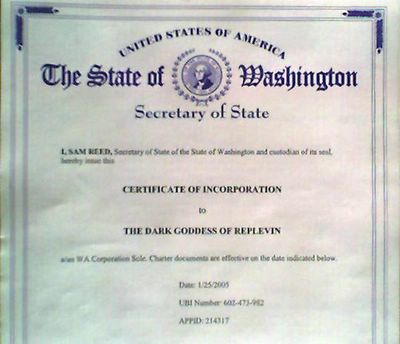I would like to express my appreciation to you and your marshal for meeting with me on Tuesday afternoon, October 18, 2016. We met to discuss the incident earlier that day in which my personal mobility aid was confiscated before my entry to the Maleng Regional Justice Center, and I was required to use a completely unsatisfactory, presumptively unsanitary, and stigmatizing substitute mobility aid in order to obtain access to the courthouse.
Although
I appreciated the promptness with which we were able to conduct at least an
initial discussion of the incident (indeed, the very promptness and informality
with which the meeting was set up may have been a contributing factor), the
meeting itself raises an additional concern for me.
I offer
the following thoughts for consideration of future meetings of this sort:
You and your marshal, two very tall and imposing men in full sheriff's regalia, directed me, an officer of the court, to a secluded conference room in the courthouse library, to receive my concerns. I laid my cane down—which had been confiscated from me by one of you just hours before as a dangerous weapon!—on the table between us, within my reach, as we spoke.
You and your marshal, two very tall and imposing men in full sheriff's regalia, directed me, an officer of the court, to a secluded conference room in the courthouse library, to receive my concerns. I laid my cane down—which had been confiscated from me by one of you just hours before as a dangerous weapon!—on the table between us, within my reach, as we spoke.
Many,
if not most, people would find providing unsparing criticism face-to-face with two
authority figures, particularly law enforcement, alone in a confined and secluded
space, a highly intimidating prospect.
I am
not asserting that there was any conscious intent to intimidate me. Your choice
of venue for our discussion, however, which I was hardly in a position to
challenge as an officer of the court bound to cooperate with law enforcement,
reflects a lack of understanding of its effects. I would imagine that it is
automatic for you to seek to control any situation that you enter, given your
line of work, but there is such a thing as overcontrolling a situation. You may
also have been wishing to provide confidentiality for a discussion that might
be expected to touch on my disability. If so, I thank you for that, but there
are better ways to address that concern.
It
occurred to me after the fact, but only well after the fact, that, had one of
you made a snap judgment, during this meeting, that I was making a “threatening”
or “aggressive” move towards my cane, and that I therefore needed to be
"subdued," I would have had no way of establishing that the facts
were otherwise. Given: the initial suspicion with which my innocent cane was
met (to the point where someone who actually had held it in his hand believed
that the head was made of metal, rather than resin); the intensity of my feelings
about the situation to which I had been subjected; and my tendency to wave my
hands around when I talk, I wondered in retrospect if I placed myself at
greater risk than I realized by acquiescing in your chosen venue for our
meeting. I also wonder now if I should have insisted on a witness/advocate on
my own behalf, which was not presented as an option for me, before going
forward with our meeting. Indeed, if our recollections differ about what was
said during this meeting, since it was not recorded, I have been placed at a
(numeric) disadvantage.
You were
both clearly taken aback by the intensity of my distress, or at least the force
with which I articulated that distress. I am somewhat relieved, in retrospect,
that my impassioned plea for treatment with dignity was not misevaluated as
potential aggression.
Although
I was not daunted at the time by the venue of our discussion, I am sending this
followup letter because I suspect that my background and temperament make me unusual
in this regard. The difficulty of protest when deprived of access to an
accommodation, even for a person such as myself, means that such slights occur
much more frequently than are ever brought to your attention. In fact, I did find my initial interaction at the
courthouse entrance highly intimidating, and I had to compose myself before I
could place my initial call to the ADA coordinator. An intimidating venue, however
innocently selected, adds an additional barrier to such issues being brought effectively
to your attention.
I hope
that you can receive this additional feedback in the spirit in which it is
intended. You did ask me in my meeting what suggestions I might have for the
future, so I may I add to my suggestion that you develop a coherent policy for
mobility aids a suggestion that you use less discouraging venues for the
discussion of ADA complaints. I don’t know if there is a usual protocol for
these meetings that was bypassed in my case.

